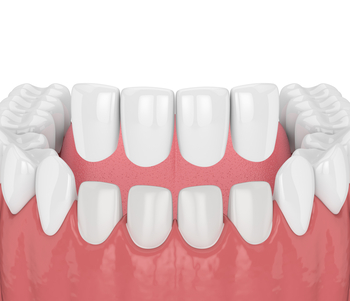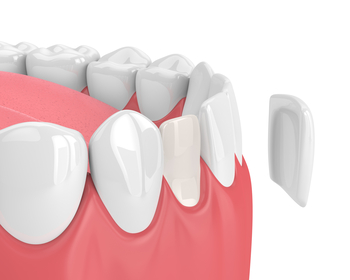Dental veneers, whether porcelain or composite veneers, are a popular cosmetic solution for enhancing smiles. However, one persistent question remains: Can you whiten veneers?
Let’s delve into this topic and explore the truth behind whitening veneers, common causes of staining, and proper maintenance for a radiant smile.
Understanding Veneers
A dental veneer is a custom-made shell bonded to the front surface of the natural tooth enamel to improve its appearance. Veneers commonly address issues such as discolouration, chipping, or misalignment. Porcelain veneers are durable and stain-resistant, while composite resin veneers offer a more affordable alternative.
Myth Debunked: Whitening Veneers

The myth of whitening veneers persists among those seeking a brighter smile. However, unlike natural teeth, veneers do not respond to traditional whitening methods.
Veneers are made from materials that resist stains, including porcelain and composite resin. Attempting to whiten veneers with over-the-counter products or DIY solutions can be ineffective and may even damage the veneer surface.
Causes Of Veneer Staining
Despite their stain-resistant properties, veneers are not completely immune to discolouration. Several factors can contribute to staining:
- Poor Dental Hygiene: Plaque and surface stains can accumulate on veneers due to improper brushing and flossing.
- Consumption Of Staining Substances: Foods and beverages such as coffee, tea, red wine, and dark-coloured fruits can stain veneers over time.
- Tobacco Use: Smoking or chewing tobacco can yellow and stain natural teeth and veneers.
- Wear And Tear: Over time, the veneer surface may become worn or damaged, making it more susceptible to staining.
- Underlying Tooth Discolouration: Discolouration of the natural tooth underneath the veneer can affect the smile’s overall appearance.
How To Remove Surface Stains Correctly
While veneers cannot be whitened traditionally, surface stains can be effectively removed through proper dental hygiene practices and professional cleanings. Here are some tips to maintain the brightness of your veneers:
Brush Your Teeth
Use soft-bristled and non-abrasive toothpaste to gently clean your teeth and veneers twice daily.
Regular Dental Check-Ups
Visit your dental professional regularly for professional cleanings and examinations to remove plaque and monitor the condition of your veneers.
Avoid Staining Substances
Restrict the amount of food and liquids that are known to discolour teeth. To minimise contact with veneers, use a straw.
Quit Smoking
If you smoke, quitting can improve your overall health and help prevent staining of your veneers and natural teeth.
Why DIY Solutions Are Not Recommended
Some individuals may use DIY whitening kits or home remedies to pursue a whiter smile. However, these methods can harm veneers and lead to undesirable outcomes.
Abrasive elements included in many DIY whitening treatments might scratch the veneer’s surface or produce uneven whitening. Furthermore, there’s a chance that whitening solutions may be overused or misused in the absence of expert supervision, endangering dental health and the integrity of veneers. You can get professional advice from an experienced dentist who can help you figure out how to restore your veneers using fresh solutions and options.
Frequently Asked Questions

Can I use teeth whitening strips on veneers?
While teeth whitening strips are designed for natural teeth, they are unsuitable for veneers. Veneers do not respond to the whitening agents in these strips, and using them may lead to uneven colouration between your natural teeth and veneers.
Do professional whitening treatments work on veneers?
Professional teeth whitening treatments conducted by dental professionals are generally not recommended for veneers. The materials used in veneers, especially porcelain, do not respond to the bleaching agents used in professional whitening procedures.
Can I have my veneers replaced or updated for a whiter smile?
If your veneers have become stained or discoloured over time, replacing or updating them may be a viable solution. Consult with your dentist to explore the possibility of enhancing the shade of your veneers for a brighter and more aesthetically pleasing smile.
How long do veneers last?
Veneers have varying lifespans based on dental cleanliness, habits, and material composition. Veneers made of composite materials may not last as long as porcelain veneers, which typically last 10 to 15 years. Maintaining your veneers with appropriate care and routine dental exams can help them last longer.
Is it possible to whiten teeth while having veneers?
Yes, you can whiten your natural teeth, even if you have veneers. It’s crucial to choose whitening methods that won’t harm the veneers. Consult your dentist to develop a safe and effective whitening plan, considering your natural teeth and veneers.
What should I do if my veneers develop stains?
If you notice stains on your veneers, addressing the underlying cause is essential. Practise good oral hygiene, avoid staining substances, and seek professional cleaning from your dentist. In some cases, replacing or updating the veneers may be necessary for optimal results.
Revitalising Your Cosmetic Veneers
The myth of whitening veneers is debunked. While veneers resist staining, they are not invulnerable to discolouration. Proper dental hygiene, regular professional cleanings, and avoiding staining substances are key to maintaining the brightness of veneers.
Attempting DIY whitening solutions can be detrimental to the integrity of veneers, and it’s advisable to consult a dental professional for safe and effective options. Remember, a radiant smile involves beautiful veneers and good oral health practices to keep your natural teeth and veneers looking their best.
Call Infinity Dental Care, Winston Hills, NSW 2153, at (02) 9159 6237 to keep your veneers radiant and aesthetically pleasing.
Sources
Colgate. “Can You Whiten Veneers?” Colgate, 9 Feb. 2022, www.colgate.com/en-us/oral-health/veneers/can-you-whiten-veneers.
Elle, Vanessa. “What to Know Before You Get Veneers.” Glam, 5 Oct. 2022, www.glam.com/1039719/what-to-know-before-you-think-about-getting-veneers.
Soliman, Ingy S., et al. “Effect of Electronic Cigarettes Smoking on Color Stability of Lithium Disilicate Glass Ceramic Veneers.” Egyptian Dental Journal, vol. 69, no. 3, July 2023, pp. 2019–27. https://doi.org/10.21608/edj.2023.196292.2462.
“UK’s First Teeth Whitening Toothpaste for Veneers.” British Dental Journal, vol. 235, no. 12, Dec. 2023, p. 989. https://doi.org/10.1038/s41415-023-6683-y.
Wakami, Masanobu. “Improvement of Aesthetics by Porcelain Laminate Veneers.” Nihon Hotetsu Shika Gakkai Zasshi, vol. 50, no. 1, Jan. 2006, pp. 83–86. https://doi.org/10.2186/jjps.50.83.

